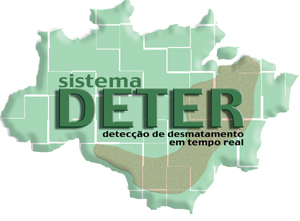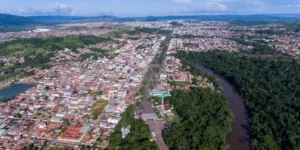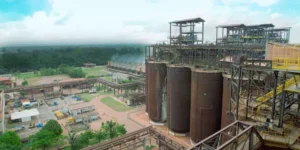In 1967, American millionaire Daniel Ludwig set up his controversial Jari Project in Pará. Nine years later, his representatives requested that Iterpa regularize 32 of his many land titles. Ludwig arrived in the Amazon thinking he owned 3.6 million hectares between Pará and Amapá. His lawyers told him that the total could be as high as 1.6 million. But it was necessary to clarify the legal and factual situation, which was extremely complex and uncertain. There were all kinds of documents, from ownership titles to Torrens registrations, from sesmarias to leases.
In 1982, Ludwig sold his project to a consortium of national companies, formed quickly by Minister Delfim Netto, under the leadership of Augusto Antunes. Since then, the land issue has remained unclear. What has changed is the situation in the area. Jari now has a new owner, Sérgio Amoroso from São Paulo. And it no longer produces kaolin. Bleached cellulose for paper was replaced by liquid cellulose for fabrics. The company began to manage forests to produce and sell solid wood, which was only used internally as an energy source or discarded. Previously isolated, the region was occupied by squatters and, in recent times, invaded by land grabbers, speculators and timber extractors. It is no longer the company’s exclusive domain, as it was during the 15 years of Ludwig’s empire. Due to the tension, a working group linked to the National Commission to Combat Violence in the Countryside was created more than a year and a half ago. The company, accused of evicting residents from their properties and practicing arbitrary acts, agreed to suspend all legal actions it had proposed until a decision on the dispute was made. However, a lawsuit filed by the State Attorney General’s Office continued to obtain a declaration that the lands claimed in the municipality of Almeirim are public and not private.
On Wednesday, the 1st, the working group was to decide on the final form of the Conduct Adjustment Agreement that would allow the company to resume normal activities and regularize the occupations of third parties, who would receive property titles for the areas where they live and work.
The meeting was frustrated because the public prosecutor for agrarian justice Ione Missae Nakamura and the public agrarian defender of Santarém, Andreia Macedo Narreto, did not attend. The prosecutor Ione explained that she could not leave the district because of the election period.
The public defender Andreia Macedo simply sent by email the reasons that placed her against the draft TAC, repeating the same arguments as the prosecutor. This reasoning was also endorsed by the State Attorney, Maria Tereza Rocha, who replaced the Attorney General, Caio Trindade. The Attorney General of Justice, Marco Antonio Neves, also did not attend.
Attorney Maria Tereza Rocha, emphasizing that she had received the invitation to the meeting the day before it was to be held, did not think it was “prudent to decide” on the TAC, which was the subject of the meeting, without the presence of the representatives of the MPE and the Public Defender’s Office.
The Justice Inspector of Amapá, Judge Constantino Tork Brahuna, argued that the absence of the two members of the group “cannot serve as an obstacle to the continuation of the actions aimed at regularizing the Jari lands”, in order to take advantage of the meeting, which would require travel and suspension of other work, as in the case of Constantino himself.
Judge Gercino Silva then decided to suspend the meeting, which should not take place again this year. The date was set by Iterpa (the Pará Land Institute), according to its president, Carlos Lamarão Correa, precisely because the national agrarian ombudsman and president of the commission against violence would only have two days this week to hold the meeting. His schedule is full until December.
The judge did not accept the suggestion that, even without deliberating, the working group could discuss the content of the TAC, including the criticisms of the prosecutor and the defender of Santarém, in order to advance in addressing the problem.
Defender Andreia said in her message that two provisions of the TAC “are completely harmful to farming families, as they violate the right to access to land, food and work, as they only guarantee land regularization/legitimation/donation up to the limit of one rural module (legitimation) or 100 hectares (donation), disregarding the possession and occupation of workers, including areas larger than expected.”
This provision, the public defender added, “will also imply a requested eviction of the workers, regarding the surplus areas, which would represent a violation of the right to housing, stipulated for decades, as well as to work, excluding areas for plantations and construction of improvements”. .
The defender understands that the TAC “treats rural workers and the company differently, giving Jari Celulose an advantage over the workers”, noting that Iterpa did not present the legal conditions under which the lands sought by Jari will be regularized, “nor the limit of the area of land to be regularized by the company, although the TAC does provide for this for rural workers”.
Jari manager, Maria Marilete Ribeiro Martins, recalled during the meeting that the company “has not filed any more lawsuits for repossession with regard to the areas it claims” since the first meeting of the working group. However, the action by the State Attorney’s Office to declare the lands as public was maintained.
Manager Maria Martins pointed out that the Jari management plan, which has been in place for 10 years, with an official license, employing four thousand people, is at risk of complete shutdown, while invasions in the company’s area “have increased significantly since May 2013, an increase estimated at 50% and carried out through clear-cutting and burning”.
Therefore, announced lawyer Marcelo Guedes Nunes, the company “is obliged, based on these data, to analyze the critical cases of invasion and destruction of its private property in order to evaluate and, when urgent, take the appropriate legal measures against the invaders, including those of a possessory nature”. In other words: the problem threatens to return to a new point of conflict, destroying years of work. Ana seeks a negotiated solution. The melancholic stage of the meeting the day before yesterday, victimized by the absence of the prosecutor and the defense attorney, with the support of the state attorney, shows the government’s insensitivity, omission and strange procedure to resolve once and for all a serious social and economic issue. This impasse involves millions of hectares of land, thousands of people and several hundred million reais of public and private investment to create a production hub in a region that was previously isolated and is now affected by the same problems that have plagued life in Pará.
The prosecutor and the defender seem to suspect (if they are not sure of this position) that Iterpa (the Pará Land Institute) is in favor of the company’s interests and against the workers. The assumption is empty if it is not proven. The proof is simple. Iterpa carried out the registration of the occupants of lands under dispute with the company. The registry has all the information to clarify the conflict.
At the end of the declaratory act of the farmers themselves, Iterpa measured the number of beneficiaries, the size of their lands and the improvements they added to them. The prosecutor Ione Nakamura and the defender Andreia Barreto have already provided evidence that the registry is flawed, false, incomplete, irregular or whatever. This would discredit the project and force the reproduction of the work under the supervision of both institutions. Or, if a parallel survey were to be conducted, the results should be presented to contradict those of Iterpa.
If there is no such parallel parameter for comparison, the public interest, instead of being obstructed by willful initiatives or harmful criticism, would be served by the selection of a demonstration area. Under supervision and control, Iterpa would settle the land. If the work were approved, it would issue the titles, moving on to the remaining lands until, in a process that is tense and difficult, the main land problem in Pará would not remain unresolved in 2016.
A problem of this magnitude cannot be dependent on or held back by personal idiosyncrasies. If doubts and criticisms persist, they should be presented publicly and resolved in direct, frank, honest and – without ever forgetting – competent dialogue. Otherwise, Pará will continue to be incapable of dealing with what is its own and its right.








